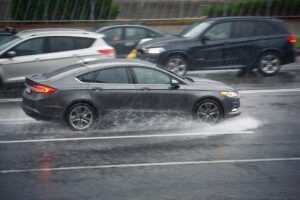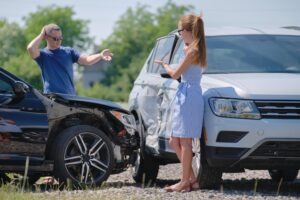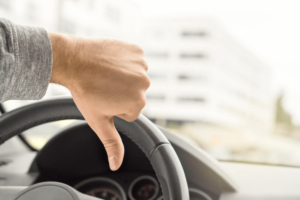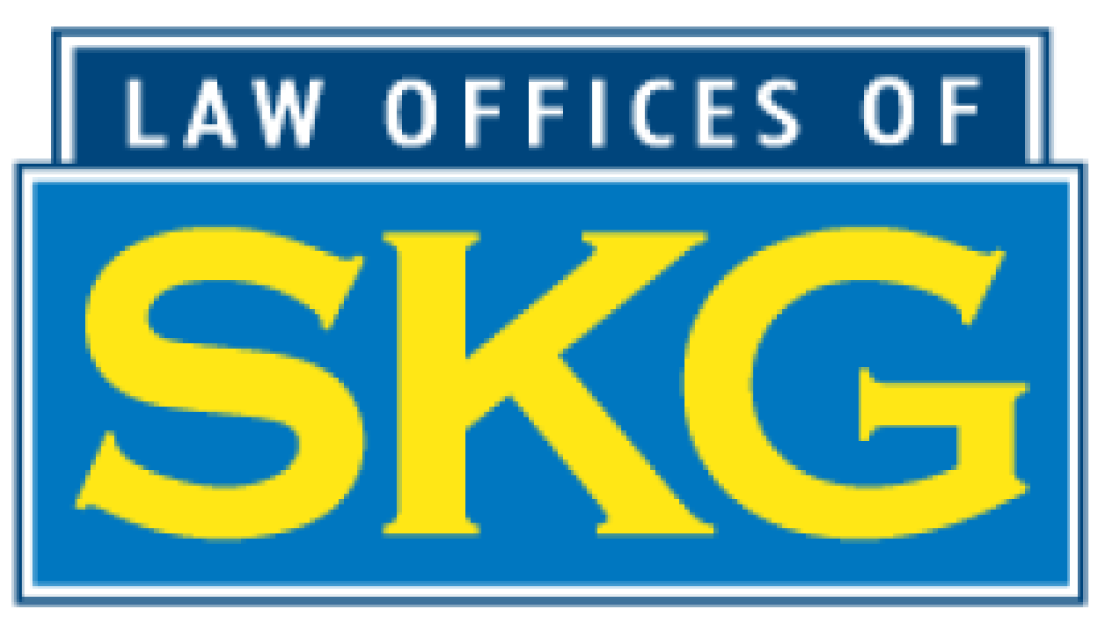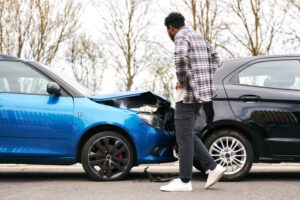
At the scene of the accident, you should focus on safety first. If possible, move your vehicle to a secure spot and turn on hazard lights to avoid further collisions. Check yourself and others for injuries, and call 911 immediately to report the crash.
Once emergency services are on the way, gather important details. Take photos of vehicle damage, road conditions, and any visible injuries. Exchange contact and insurance information with the other driver, and if witnesses are present, get their statements. These details can help strengthen your case.
A Fort Lauderdale car accident lawyer can protect your rights and handle the legal fight while you focus on recovery. Contact us today for a free consultation and take the first step toward justice.
Move to a Safe Location
If you’re in a car accident, a Fort Lauderdale personal injury lawyer knows that safety comes first. Move your vehicle to a secure spot, if possible, like the side of the road or a parking lot. If you can’t move it, turn on your hazard lights to warn other drivers.
Be cautious when getting out of your car. The area may be dangerous, especially with oncoming traffic. Take note of important details like location, time, and weather conditions. These factors can help when filing a report or making an insurance claim.
Your safety should always be the priority. Stay calm, assess the situation, and take the necessary steps to protect yourself. If you need legal guidance, we’re here to help.
More people choose The Schiller Kessler Group because they know that we’re a cut above other personal injury law firms.

Check for Injuries and Provide Assistance
After reaching a safe spot, check for injuries and call emergency services if needed. Stay calm and act fast—quick medical care matters.
Call Emergency Services
At the scene of an accident, calling emergency services should be your first step. The sooner help arrives, the better. Dial 911 from a safe location and give details like the crash site, number of vehicles, and any hazards.
Stay on the line and follow the operator’s instructions. If you’re in a dangerous spot, like a busy highway, move to safety before calling. Keeping calm and providing clear information can help responders act quickly.
Emergency crews know how to handle these situations. Their fast response can make a difference in getting medical care and securing the scene. Your role is to stay safe and give them the details they need.
Check for Injuries
As sirens approach, focus on those involved in the accident. Check yourself first—if you’re injured, you won’t be able to help others. If you’re okay, check on your passengers, then others involved. Approach carefully, as they may be disoriented or in shock.
Avoid moving anyone unless they’re in immediate danger, as this could worsen their injuries. Take note of anyone unconscious, bleeding, or in severe pain—they may need urgent medical attention. Staying calm and aware can make a difference while waiting for help.
Provide Basic Aid
Call for medical help right away if someone is critically injured. In life-threatening situations, every second matters. Keeping the injured as calm and still as possible can help prevent further harm.
If someone is bleeding, apply gentle pressure with a clean cloth. Avoid moving anyone who is unconscious or may have a neck or spine injury. If someone isn’t breathing, perform CPR only if you’re trained.
If you’re unsure what to do, wait for emergency responders to take over. Your role is to provide basic aid and keep everyone safe until help arrives. Staying calm and focused can make a difference in a critical moment.
Call the Authorities and Report the Accident
Once you and others are safe, call 911 to report the accident. Provide your location, a brief description of what happened, and the number of people involved. If there are injuries, let the operator know so they can send medical help.
When the police arrive, they will document the scene and create an accident report. This report is important for insurance claims and legal matters. Be honest and cooperative, but avoid admitting fault or apologizing—stick to the facts.
Ask for the officer’s name, badge number, and a copy of the accident report if possible. This information will be helpful when dealing with insurance companies and any legal claims that may follow.
Gather Evidence and Document the Scene
While waiting for authorities, gather evidence for your insurance claim or legal case. Take photos of the scene, vehicle damage, and injuries. If possible, record witness statements—they can help prove what happened.
Take Photos and Videos
After exchanging information and checking on everyone’s safety, it’s time to document the scene. Use your phone to take photos of vehicle damage, visible injuries, and license plates. Capture makes and models of all cars involved.
Record the surrounding area, including traffic signs, road conditions, skid marks, and debris. Take videos while narrating details to provide clear evidence. This documentation can be valuable for insurance claims and legal proceedings.
Record Witness Statements
Before leaving the scene, talk to any witnesses and ask for their account of the accident. Get their name, phone number, and email. Record or write down their statements, noting what they saw, heard, or smelled.
Their testimony can help support your insurance claim or legal case. Ask clear questions and stay respectful. Thank them for their time— their input could make a difference in proving what happened.
Exchange Information With Other Parties
Knowing what to do at the scene of a car accident can make a big difference in your case. After checking for injuries, exchange information with the other driver. Get their name, phone number, address, and insurance details. If passengers or pedestrians were involved, collect their contact information, too.
Document everything. Take photos of vehicle damage, visible injuries, and license plates. Snap a picture of the other driver’s insurance card if possible. These details will be important for your police report and insurance claim.
Stay calm and be polite, but don’t apologize or admit fault. Stick to the facts and avoid discussing liability. Gathering the right information now can protect your rights later.
Notify Your Insurance Provider
After gathering all necessary details, notify your insurance provider as soon as possible. Reporting the accident quickly helps start the claims process and secures the support you need.
When calling, have key details ready, including the police report number, the other party’s information, and any photos or videos you took. Be honest and accurate when describing what happened to avoid delays.
Ask about the next steps and what documents are required for your claim. Acting fast allows you to focus on recovery while your insurance provider handles the process.
Get Justice With a Fort Lauderdale Car Accident Lawyer on Your Side
Knowing what to do at the scene of a car accident is just the first step. As you focus on recovery, legal challenges can arise—insurance companies may push back, and proving fault isn’t always simple. That’s where we come in.
At The Schiller Kessler Group, we have spent over three decades fighting for car accident victims. A Fort Lauderdale car accident lawyer from our team can handle the legal battle, hold the right parties accountable, and fight for the financial recovery you need.
You don’t have to take on this fight alone. Let us handle the legal work while you focus on healing. Contact The Schiller Kessler Group today for a free consultation.
Injured? Call The Aggressive Attorneys Today


